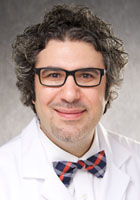 A newly released basic science study of Roux-en-Y gastric bypass (RYGB) by Dr. Mohamad Mokadem, Assistant Professor of Gastroenterology and Hepatology, suggests that a functioning circadian clock, or sleeping at night and being awake during the day, can help patients achieve a higher amount of weight loss following the surgery. The study conducted in a mouse model is one of the first to shed light on how researchers and clinicians might continue to improve the outcomes following RYGB by correcting disruptions to the circadian clock. The findings were unveiled during a poster presentation at the Obesity Society Annual Meeting in New Orleans.
A newly released basic science study of Roux-en-Y gastric bypass (RYGB) by Dr. Mohamad Mokadem, Assistant Professor of Gastroenterology and Hepatology, suggests that a functioning circadian clock, or sleeping at night and being awake during the day, can help patients achieve a higher amount of weight loss following the surgery. The study conducted in a mouse model is one of the first to shed light on how researchers and clinicians might continue to improve the outcomes following RYGB by correcting disruptions to the circadian clock. The findings were unveiled during a poster presentation at the Obesity Society Annual Meeting in New Orleans.
Prior research observations suggest that appropriate timing of calorie consumption and minimal disruption of the light/dark cycle set by the environment are crucial for a healthy energy balance and metabolism. However, little is known about the potential role of this molecular clock on maximizing the beneficial metabolic effects of bariatric surgery.
“Our findings from this mouse study suggest that patients with a disrupted circadian rhythm—such as night-shift workers and those with night-eating syndrome—may not be able to achieve the maximum amount of weight loss resulting from bariatric surgery,” said Dr. Mokadem. “Our research shows that it could be important for patients to have a normal circadian clock pre-surgery to maximize weight loss following surgery.”
The research implications for patients are drawn from a study conducted in mice, which is one of the first steps toward designing and replicating such a study in humans. Study authors say that more research is needed to better understand the role of circadian rhythm regulators or “clock genes” in the reversal of obesity, including research conducted in a patient population.
“Bariatric surgery has long been recognized as one of the most effective treatments for severe obesity,” said Dr. Samer Mattar, Professor of Surgery at Oregon Health and Science University. “This study is a step toward better understanding the underlying mechanisms affecting bariatric surgery outcomes, enabling us to continue to improve upon this form of treatment.”